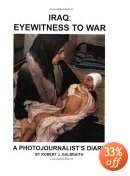Iraq: Eyewitness to War, A Photojournalist's Diary

by Robert J. Galbraith
264 pages,
ISBN: 0973638109
Post Your Opinion | | Brief Reviews: Photojournalism
by John Oughton
The continuing violence in Iraq seems much less remote when you've lived there. My year-and-a-half sojourn in Baghdad was a long time ago, during the 1958-63 reign of Abdul Karim Qassim, who had overthrown the British-appointed King Faisal. I was 13, old enough to remember that small country's enormous contrasts, both within itself, and with Canada.
Iraq is a paradox: few places in the world have been so long inhabited by such a variety of civilizations (Sumerian, Babylonian, Assyrian). The whole nation is an archeological site. I recall walking along a dusty street in Babylon and kicking over a "rock" that was in fact part of a clay tablet with cuneiform writing that predated the Western alphabet. Nobody had bothered to pick it up. The land had been lived in, farmed on, and fought over for so many millennia that it was mostly wasteland, the only green remaining near rivers or irrigation canals. Yet Iraq is a recently-established nation, formed for British convenience and interests after the end of the Ottoman Empire. Like many nations of convenience, it included disparate and long-contending groups: Marsh Arabs in the south, Bedouin in the middle, and northern Kurds; an impoverished Shi'ite majority, and a powerful Sunni minority; tribal sheiks, dirt-poor peasants, ambitious soldiers, and a few urban professionals. Only a regime as oppressive as Saddam Hussein's could override these fault lines to create the semblance of a unified nation.
Montreal photojournalist Robert J. Galbraith does his best to put Western viewers into the middle of the looting, bombings, reprisals and general chaos that ensued in 2004 when US and British Troops ousted Hussein and occupied Iraq. Galbraith is something of a veteran himself, having covered the Gulf War (unlike most journalists who are there to cover the recent "troubles"). This long and detailed book offers a diary in words and images of what he encountered during 35 days in Iraq, Kuwait and Jordan (the latter two countries might have been ignored for the sake of focus). It is, appropriately, something of a mirror of Iraq: alternately rewarding, surprising, and frustrating. There is abundant evidence of Galbraith's photojournalism skills, with many startling and effective images of soldiers, civilians, and the land itself. The cover image is an Iraqi PiFta: a grieving mother holding her blinded and badly wounded five-year-old son across her lap. Other outstanding pictures present an unexploded bomb sticking out of the soil like a high-tech tombstone, and a looter bent over by the door he is stealing, but the book is larded with too many mundane snapshots.
There are also many telling anecdotes scattered throughout the diary: Galbraith mentions visiting a family whose living room still holds physical traces of their baby, killed by a cluster bomb; seeing a rapist attack a street girl of less than 10 years of age; watching Iraqis confront each other over looting; and offering his friendship to young American soldiers who appear somewhat confused to find themselves there.
As a rule, photographers and writers should not rely on themselves alone at publication time. Editors provide useful services for a book like this: selecting the best words and photos (and leaving the rest out); correcting mistakes in grammar and writing before the reader sees them. They also add useful features like a table of contents and index (both missing here). Galbraith's writing generally has the immediacy and honesty we expect from a diary, but the all-too-frequent run-on sentences, confused punctuation, and clichTs detract from the experience. It is pointless to detail all the gaffes, but here's one small example about looters: "Are they doing it to feed their greed, or is it because of dire necessity, a need to feed a starving family." As well as the missing interrogation mark, this sentence stumbles from repetition of "feed" and the double-barrelled banality of "feed their greed" and "dire necessity."
Galbraith's compassion for everyone in Iraq-soldiers, civilians, other journalists-is evident throughout the diary. His commitment to return to his family affects how he approaches others, and he often contrasts the security and health of his own children with the many young victims he meets through his lenses. If you really want to know what's happening in Iraq, this book can be a valuable place to start. But it needs to be balanced by better-written and more analytical perspectives from others.
John Oughton went to a school in Baghdad run by the American Embassy, where he learned how the US won the War of 1812.
|